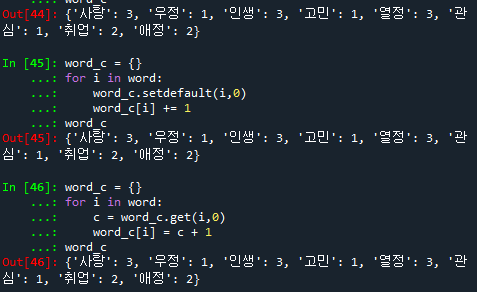더보기
▣ 주요 키워드 ▣
- 반복문
- while문
- continue, break
- ※pop(), print(end='')옵션
- for문
- ※range()
- while문
- collections
- defaultdict
- Counter
- ※get, setdefault
★ 반복문
1. while문
1. while문
- 조건이 True인 동안에 반복을 수행한다.
while 조건문:
반복수행할 문장i = 0
while i <= 10:
print(i)
i += 1
- continue, break
i = 1
while i <= 10:
if i%2 == 1:
print(i)
i += 1
else:
if i != 10:
i += 1
continue # continue문을 만나면 바로 다음 반복문을 실행함
print('실행안됨')
else:
print('끝')
break # break문을 만나면 반복문을 끝내고 나오기
print('실행안됨')
- pop() : 리스트에서 제일 마지막 인덱스에 있는 값을 추출해내기(추출하면 리스트에서 제거됨)
x = [10,25,46,78,99]
while x:
temp = x.pop() # pop() : 리스트에서 제일 마지막 인덱스에 있는 값 뽑아내기(리스트에서는 제거됨)
if temp >= 50:
print('50보다 큰 {}'.format(temp))
else:
print('50보다 작은 {}'.format(temp))
※ print(end=' ') : end옵션은 print 할 때 한 칸 띄어서 가로로 출력하는 옵션(기본값은 end = '\n')
2. for문
2. for 문
리스트, 튜플, 문자열의 첫번째 값부터 마지막 값까지 순서대로 변수에 입력해서 반복수행한다.
for 변수 in (리스트, 튜플, 문자열):
반복수행할 문장# 문자열, 리스트, 튜플
x = '12345' # 문자열은 한 글자씩
for i in x:
print(i)
y = [1,2,3,4,5]
for i in y:
print(i)
z = (1,2,3,4,5)
for i in z:
print(i)
for i in 'mypython': # 문자열은 한 글자씩
print(i)
# 리스트안에 한 인덱스당 여러개의 값이 있을경우
x = [(1,2),(3,4),(5,6)]
for i in x:
print(i)
for i,j in x: # 각인덱스마다 있는 값의 개수만큼 변수를 만들어줄 수 있음
print(i, j)
※ range(시작, 끝(미만), 증가분)
list(range(1,11,1))
# 1부터 10까지 1씩 증가
★ collection
- collections.defaultdict(기본값설정함수(자료형, 함수 등)) : 모든 키에 대해서 값이 없는 경우 기본값 설정 함수를 넣어줌으로써 따로 기본값을 설정안 해도 됨
- collections.Counter() : 동일한 값이 몇 개인지 알 수 있는 함수
※ dict.get(키값, default) : get(키값) -> values값 출력, 키값이 없으면 default값 출력
※ dict.setdefault : 키값에 대해서 기본값을 설정해주는 함수
-빈도수 체크하기 여러가지 방법
word = ('사랑','우정','인생','사랑','인생','고민','열정','열정',
'관심','인생','취업','취업','애정','애정','열정','사랑')
1. 기본
word_c = {}
for i in word:
if i not in word_c:
word_c[i] = 1
else:
word_c[i] += 1
word_c
2. setdefault
word_c = {}
for i in word:
word_c.setdefault(i,0)
word_c[i] += 1
word_c
3. get
word_c = {}
for i in word:
c = word_c.get(i,0)
word_c[i] = c + 1
4. collections.defaultdict()
word_c = collections.defaultdict(int)
for i in word:
word_c[i] += 1
word_c
5. collections.Counter()
collections.Counter(word)

'PYTHON' 카테고리의 다른 글
| 파이썬 합, 평균, 분산, 표준편차, Feature Scailing(표준화, 정규화) (0) | 2022.04.09 |
|---|---|
| 파이썬(스택,pop,enumerate,큐) (0) | 2022.04.02 |
| 파이썬(operator.itemgetter,리스트 내장객체, 함수) (0) | 2022.04.02 |
| 파이썬(변수복제, input(), 조건제어문) (0) | 2022.03.27 |
| 파이썬 기초(문자열함수, 주석, 연산자, 변수, 문자함수, 자료형) (0) | 2022.03.25 |